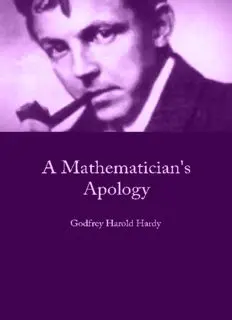Table Of ContentA Mathematician's
Apology
Godfrey Harold Hardy
A Mathematician's
Apology
Godfrey Harold Hardy
BAALTIS PUBLISHING
foreword
ItwasaperfectlyordinarynightatChrist’shightable,
exceptthatHardywasdiningasaguest. Hehadjust
returned to Cambridge as Sadleirian professor, and I
had heard something of him from young Cambridge
mathematicians.Theyweredelightedtohavehimback:
hewasareal mathematician,theysaid,notlikethose
Diracs and Bohrs the physicists were always talking
about: he was the purest of the pure. He was also
unorthodox,eccentric,radical,readytotalkaboutany-
thing. This was 1931, and the phrase was not yet in
Englishuse,butinlaterdaystheywouldhavesaidthat
insomeindefinablewayhehadstarquality.
So,fromlowerdownthetable,Ikeptstudyinghim.
He was then in his early fifties: his hair was already
gray, above skin so deeply sunburnt that it stayed a
kindofRedIndianbronze. Hisfacewasbeautiful—high
cheekbones,thinnose,spiritualandausterebutcapa-
bleofdissolvingintoconvulsionsofinternalgamin-like
amusement. He had opaque brown eyes, bright as a
bird’s—akindofeyenotuncommonamongthosewith
agiftforconceptualthought. Cambridgeatthattime
wasfullofunusualanddistinguishedfaces—buteven
then,Ithoughtthatnight,Hardy’sstoodout.
I do not remember what he was wearing. It may
easilyhavebeenasportscoatandgreyflannelsunder
hisgown. LikeEinstein,hedressedtopleasehimself:
though,unlikeEinstein,hediversifiedhiscasualcloth-
ingbyatasteforexpensivesilkshirts.
Aswesatroundthecombination-roomtable,drink-
ingwineafterdinner,someonesaidthatHardywanted
totalktomeaboutcricket. Ihadbeenelectedonlya
yearbefore,butChrist’swasthenasmallcollege,and
thepastimesofeventhejuniorfellowsweresooniden-
tified. Iwastakentositbyhim. Iwasnotintroduced.
He was, as I later discovered, shy and self-conscious
inallformalactions,andhadadreadofintroductions.
He just put his head down as it were in a butt of ac-
knowledgment,andwithoutanypreamblewhat-ever
began:
‘You’resupposedtoknowsomethingaboutcricket,
aren’tyou?’ Yes,Isaid,Iknewabit.
Immediatelyhebegantoputmethroughamoder-
atelystiffviva. DidIplay? Whatsortofperformerwas
I?Ihalf-guessedthathehadahorrorofpersons,then
prevalentinacademicsociety,whodevotedlystudied
theliteraturebuthadneverplayedthegame. Itrotted
out my credentials, such as they were. He appeared
tofindthereplypartiallyreassuring,andwentonto
moretacticalquestions. WhomshouldIhavechosen
ascaptainforthelasttestmatchayearbefore(inold-
stylenums1930)? IftheselectorshaddecidedthatSnow
wasthemantosaveEngland,whatwouldhavebeen
2
mystrategyandtactics? (‘Youareallowedtoact,ifyou
aresufficientlymodest,asnon-playingcaptain.’) And
soon,oblivioustotherestofthetable. Hewasquite
absorbed.
As I had plenty of opportunities to realize in the
future,Hardyhadnofaithinintuitionsorimpressions,
hisownoranyoneelse’s. Theonlywaytoassesssome-
one’sknowledge,inHardy’sview,wastoexaminehim.
Thatwentformathematics,literature,philosophy,poli-
tics,anythingyoulike. Ifthemanhadbluffedandthen
wiltedunderthequestions,thatwashislookout. First
things came first, in that brilliant and concentrated
mind.
That night in the combination-room, it was nec-
essary to discover whether I should be tolerable as
a cricket companion. Nothing else mattered. In the
end he smiled with immense charm, with child-like
openness,andsaidthatFenner’s(theuniversitycricket
ground)nextseasonmightbebearableafterall,with
theprospectofsomereasonableconversation.
Thus, just as I owed my acquaintanceship with
LloydGeorgetohispassionforphrenology,Iowedmy
friendshipwithHardytohavingwastedadispropor-
tionateamountofmyyouthoncricket. Idon’tknow
whatthemoralis. Butitwasamajorpieceofluckfor
me. This was intellectually the most valuable friend-
shipofmylife. Hismind,asIhavejustmentioned,was
brilliantandconcentrated: somuchsothatbyhisside
anyoneelse’sseemedalittlemuddy,alittlepedestrian
and confused. He wasn’t a great genius, as Einstein
and Rutherford were. He said, with his usual clarity,
3
thatifthewordmeantanythinghewasnotagenius
atall. Athisbest,hesaid,hewasforashorttimethe
fifthbestpuremathematicianintheworld. Sincehis
characterwasasbeautifulandcandidashismind,he
alwaysmadethepointthathisfriendandcollaborator
Littlewoodwasanappreciablymorepowerfulmathe-
maticianthanhewas,andthathisprotégéRamanujan
reallyhadnaturalgeniusinthesense(thoughnottothe
extent,andnothinglikesoeffectively)thatthegreatest
mathematicianshadit.
People sometimes thought he was under-rating
himself,whenhespokeofthesefriends. Itistruethat
hewasmagnanimous,asfarfromenvyasamancan
be: butIthinkonemistakeshisqualityifonedoesn’t
accept his judgment. I prefer to believe in his own
statementinAMathematician’sApology,atthesame
time so proud and so humble: ‘I still say to myself
whenIamdepressedandfindmyselfforcedtolisten
to pompous and tiresome people, “Well, I have done
one thing you could never have done, and that is to
havecollaboratedwithLittlewoodandRamanujanon
somethinglikeequalterms.”’
Inanycase,hispreciserankingmustbelefttothe
historiansofmathematics(thoughitwillbeanalmost
impossiblejob,sincesomuchofhisbestworkwasdone
incollaboration). Thereissomethingelse,though,at
whichhewasclearlysuperiortoEinsteinorRutherford
or any other great genius: and that is at turning any
workoftheintellect,majororminororsheerplay,into
aworkofart. Itwasthatgiftaboveall,Ithink,which
made him, almost without realizing it, purvey such
4
intellectualdelight. WhenAMathematician’sApology
wasfirstpublished,GrahamGreeneinareviewwrote
thatalongwithHenryJames’snotebooks,thiswasthe
bestaccountofwhatitwasliketobeacreativeartist.
ThinkingabouttheeffectHardyhadonallthoseround
him,Ibelievethatistheclue.
He was born, in 1877, into a modest professional
family. HisfatherwasBursarandArtMasteratCran-
leigh,thenaminorpublic(Englishforprivate)school.
His mother had been senior mistress at the Lincoln
Training College for teachers. Both were gifted and
mathematicallyinclined. Inhiscase,asinthatofmost
mathematicians,thegenepooldoesn’tneedsearching
for. Muchofhischildhood,unlikeEinstein’s,wastypi-
calofafuturemathematician’s. Hewasdemonstrating
aformidablyhighi.q. assoonas,orbefore,helearned
totalk.Attheageoftwohewaswritingdownnumbers
uptomillions(acommonsignofmathematicalability).
When he was taken to church he amused himself by
factorizingthenumbersofthehymns: heplayedwith
numbers from that time on, a habit which led to the
touchingsceneatRamanujan’ssick-bed: thesceneis
well known, but later on I shall not be able to resist
repeatingit.
It was an enlightened, cultivated, highly literate
Victorianchildhood. Hisparentswereprobablyalittle
obsessive,butalsoverykind. ChildhoodinsuchaVic-
torianfamilywasasgentleatimeasanythingwecould
provide,thoughprobablyintellectuallysomewhatmore
exacting. Hiswasunusualinjusttworespects. Inthe
firstplace,hesufferedfromanacuteself-consciousness
5
atanunusuallyearlyage,longbeforehewastwelve.
Hisparentsknewhewasprodigiouslyclever,andso
didhe. Hecametopofhisclassinallsubjects. But,as
the result of coming top of his class, he had to go in
frontoftheschooltoreceiveprizes: andthathecould
not bear. Dining with me one night, he said that he
deliberatelyusedtotrytogethisanswerswrongsoas
to be spared this intolerable ordeal. His capacity for
dissimulation,though,wasalwaysminimal: hegotthe
prizesallthesame.
Some of this self-consciousness wore off. He be-
camecompetitive. AshesaysintheApology: ‘Idonot
rememberhavingfelt,asaboy,anypassionformathe-
matics,andsuchnotionsasImayhavehadofthecareer
ofamathematicianwerefarfromnoble. Ithoughtof
mathematicsintermsofexaminationsandscholarships:
Iwantedtobeatotherboys,andthisseemedtobethe
wayinwhichIcoulddosomostdecisively.’ Neverthe-
less, he had to live with an over-delicate nature. He
seemstohavebeenbornwiththreeskinstoofew. Un-
likeEinstein,whohadtosubjugatehispowerfulego
inthestudyoftheexternalworldbeforehecouldat-
tainhismoralstature,Hardyhadtostrengthenanego
whichwasn’tmuchprotected. Thisattimesinlaterlife
madehimself-assertive(asEinsteinneverwas)when
hehadtotakeamoralstand. Ontheotherhand,itgave
himhisintrospectiveinsightandbeautifulcandor,so
thathecouldspeakofhimselfwithabsolutesimplicity
(asEinsteinnevercould).
Ibelievethiscontradiction,ortension,inhistem-
peramentwaslinkedwithacuriousticinhisbehavior.
6
Hewastheclassicalanti-narcissist. Hecouldnoten-
dure having his photograph taken: so far as I know,
thereareonlyfivesnapshotsinexistence. Hewould
not have any looking glass in his rooms, not even a
shavingmirror. Whenhewenttoahotel,hisfirstac-
tionwastocoverallthelooking-glasseswithtowels.
Thiswouldhavebeenoddenough,ifhisfacehadbeen
likeagargoyle: superficiallyitmightseemodder,since
allhislifehewasgood-lookingquiteoutoftheordi-
nary. But, of course, narcissism and anti-narcissism
havenothingtodowithlooksasoutsideobserverssee
them.
Thisbehaviorseemseccentric,andindeeditwas.
Between him and Einstein, though, there was a dif-
ference in kind. Those who spent much time with
Einstein—suchasInfeld—foundhimgrowstranger,less
likethemselves, thelongertheyknewhim. Iamcer-
tainthatIshouldhavefeltthesame. WithHardythe
opposite was true. His behavior was often different,
bizarrely so, from ours: but it came to seem a kind
ofsuperstructuresetuponanaturewhichwasn’tall
that different from our own, except that it was more
delicate,lesspadded,finer-nerved.
The other unusual feature of his childhood was
moremundane: butitmeanttheremovalofallpracti-
calobstaclesthroughouthisentirecareer. Hardy,with
his limpid honesty, would have been the last man to
be finicky on this matter. He knew what privilege
meant,andheknewthathehadpossessedit. Hisfam-
ilyhadnomoney,onlyaschoolmaster’sincome,but
theywereintouchwiththebesteducationaladviceof
7

